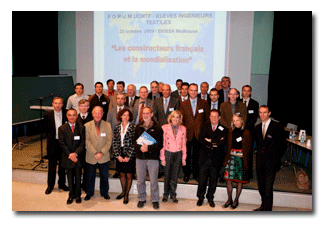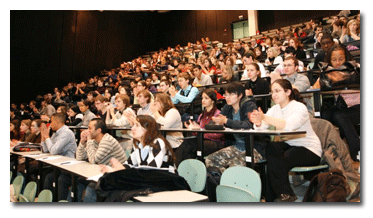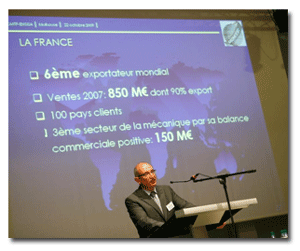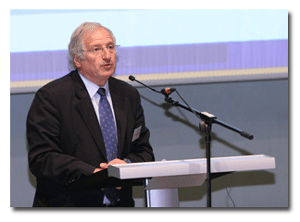T
he French Textile Machinery Manufacturers’ Association (UCMTF) once again brought
together the students from the four French universities that train engineers for the textile
industries. The goal was to further enhance relations with the students and to review the careers
offered to them both in France and worldwide.
The forum was organized on the campus of l’Ecole Nationale Supérieure d’Ingénieurs Sud Alsace
(ENSISA), located in Mulhouse. Students from l’Ecole Nationale Supérieure des Arts et Industries
Textiles (ENSAIT), Roubaix; ITECH-Lyon; and the textile department of Haute Etudes d’Ingénieur
(HEI), Lille, joined the forum. More than 250 manufacturers, teachers and students participated.

Forum speakers gather for a group photograph.
Despite the economic crisis, the French manufacturers’ dynamism is obvious. To become even
stronger when investments recover, they are increasing their research and development and marketing
budgets.
The 30 companies that make up UCMTF achieve a turnover of nearly 1 billion euros, making
France the sixth-ranking textile machinery exporter worldwide. They employ directly or indirectly
more than 8,000 people, and more than 90 percent of their sales comprise machinery exported to more
than 100 countries all over the world. Presenting these figures, UCMTF Chairman Bruno Ameline
emphasized that the textile machinery market is still dominated by the European manufacturers —
for historical reasons, of course, but mainly thanks to their commitment to answering their
customers’ needs, providing machinery for developing new products and/or for optimizing the
production processes.

Textile engineering students from four French universities participated in UCMTF’s forum
promoting careers in the textile machinery sector.
After welcome speeches given by Ameline, UCMTF Education Commission President Marc Brabant
and ENSISA CEO Gérard Binder, Gildas Minvielle of the French Fashion Institute analyzed the state
of the textile industry and the main trends that are shaping its future. He explained how the
textile industry was one of the first industrial sectors to face the globalization process and how
it has adapted itself to this new environment. The students expressed their realism about the
challenges and their hopes for new products, particularly in the industrial fabrics sector.

UCMTF Chairman Bruno Ameline stressed that European textile machinery manufacturers
dominate the market and are committed to providing their customers with machinery for new product
development and/or for production process optimization.
Three panel discussions provided an opportunity for UCMTF members to present their strategies
and their new machines:
• Combing, spinning, yarn processing and weaving
Participating companies : N. Schlumberger S.A.S., RITM, Petit, Superba S.A.S, Stäubli
France
• Nonwovens
Participating companies: Asselin-Thibeau, Laroche S.A., Rieter Perfojet S.A.S.
• Finishing and air engineering
Participating companies: Alliance, Rousselet S.A., Dollfus & Muller S.A.S, AESA Air
Engineering.

Marc Brabant, president of UCMTF’s education commission, welcomes participants at the
forum, held at l’Ecole Nationale Supérieure d’Ingénieurs Sud Alsace.
Following the panel discussions, Claude Levy-Rueff of Brouardel Communication — organizer of
SECURIVET, a conference focused on the protective garment sector — introduced a study conducted
with the machinery manufacturers that shows the importance of the return on investment in
customers’ decisions, with the cost savings in energy consumption being particularly important.
Levy-Rueff also reported on SECURIVET 2009, which took place last June in Paris. The
conference demonstrated that the protective garment sector is still a growing industry that offers
multiple career opportunities to textile engineers.
Then followed a roundtable discussion of today’s and tomorrow’s job opportunities for textile
engineers. Five alumni of different ages presented their own careers, the know-how and the
interpersonal skills required for one’s own success.
Editor’s note: This report was based primarily on information provided by the French Textile
Machinery Manufacturers’ Association (UCMTF). For more information, contact UCMTF
info@ucmtf.com.
December 2009




